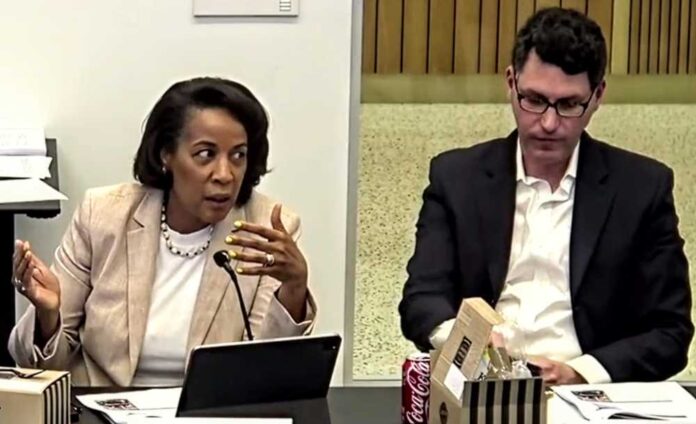Arlington’s representative in a panel that is studying D.C. Metro financing opposes a regional sales tax for the transit system.
Matt de Ferranti, a member of the County Board, believes that Virginia, D.C., and Maryland should all decide how they are going to pay for these extra regional costs, which are now estimated between $500 million and $600 million per year.
At a meeting on Friday, de Ferranti’s supporters outnumbered those who supported a regional tax to fund the Metro.
There are two choices:
- Option B: Let the three jurisdictions decide independently how they are going to raise the additional funds. For Northern Virginia, the amount is expected to be between $150 and $180 million in the first year.
- Option A: Increase the sales tax rates in the region to a level that will raise enough funds. In addition to Virginia, this would amount to approximately $190 to $225 millions the first year and $170 to $200 million in Maryland.
Nick Donohue is a former Virginia State Transportation official and facilitator of the DMV moves initiative. The Washington Metropolitan Area Transit Authority and the Metropolitan Washington Council of Governments have collaborated on this project.
De Ferranti’s response to the question was direct when the discussion shifted to him.
Ferranti stated, “Fully option A”
Jeff McKay of the Fairfax County Board, as well as other Northern Virginia leaders, have echoed this support.
McKay said, “I’d definitely prefer Option A.” There are many challenges with Option B. For some, the biggest challenge is the loss of autonomy, input and structure at the local level.
Randall stated that “you can never refer to anything as ‘permanent,’ or ‘dedicated,’ if you rely on elections and the people in office right now.”
She said that localities could not guarantee their future funding if they did not have a dedicated, permanent funding source.
She said, “A different board may decide to do something else and be willing to take it to court.” “That’s life.”
Fairfax County Supervisor Rodney Lusk, however, said that a funding approach that is one size fits all would be unrealistic due to the dynamics of the D.C. region.
He said, “We must respect the fact that jurisdictions differ.”
Northern Virginians pay a sales tax of 6%, with 4,3% going to state government, 1% for the locality, and 0.7% to regional transportation projects. Certain items, like groceries, are taxed lower.
Maryland officials expressed their support for local autonomy in deciding how to pay additional costs at the DMV Moves event.
Marc Korman, Maryland House of Delegates member, said that the state does not have a local sales tax, and it is “extremely unlikely,” for transit or any other reason, to introduce one.
Maryland charges 6% on all purchases. However, this revenue goes to the state.
Phil Mendelson, a member of the D.C. City Council, expressed reservations about both options but chose to support a regional sales taxes.
DMV Moves leaders did not take an official count, but they said that they used the results to create a plan in which the jurisdictions would have the final say on how they raised the money.
The organization is looking for agreement from participating localities on an investment of up to $600 million per year in Metro’s bus and rail networks.
The amount of the annual increase is yet to be determined. Planning documents included a figure of “at minimum 3%”.
Charles Allen, co-chairman of the D.C. City Council, said that he would be fine with an “employee-driven” approach to funding. He said that it would be better if the funding was done by the group itself, but a regional commitment to create an ironclad structure is required.
Allen asked, “What’s the use?” if localities cannot guarantee that they will meet their funding commitments.
Work groups will develop the details of the financing mechanism in the coming months before making a final recommendation this fall. The D.C. City Council, as well as the legislatures in Virginia and Maryland, will ultimately have to approve any new financial compact.
Randy Clarke, WMATA’s general manager, noted that the clock is ticking and plans must be in place before next fall in order to be prepared for when new funding begins in late 2027.
He said, “We have one year to solve this problem.” If it’s not solved, we will have to make changes to our capital plan.
The meeting last week also provided an update on the region’s efforts to upgrade and expand bus routes that have the most riders.
De Ferranti stated that he wanted to delay the discussion until after the decision on additional funding.
“I don’t think it’s an ‘now’ discussion, but a conversation in January,” said de Ferranti. He is Arlington’s representative on the Northern Virginia Transportation Commission’s board of directors.
NEWSLETTER SIGNUP
Subscribe to our newsletter! Get updates on all the latest news in Virginia.



